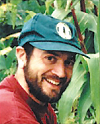|
By Jenny Coyle
Marilyn Wall - Cincinnati, Ohio
Conservation Chair, Ohio Chapter
 Marilyn Wall is proof that there's a place for everyone in the Sierra Club - she's a city-dweller who studied math in college, worked in the computer biz for 21 years, and was the technical manager for a health insurance company installing hardware and software on large mainframes. Marilyn Wall is proof that there's a place for everyone in the Sierra Club - she's a city-dweller who studied math in college, worked in the computer biz for 21 years, and was the technical manager for a health insurance company installing hardware and software on large mainframes.
Doesn't exactly sound like John Muir's sister, does she?
"I'm definitely a city girl," she says, and she loves taking on the devil in the details - laws, regulations, petitions, especially as they concern clean air. "In some ways I think it's more disturbing to work on issues like endangered species and habitat destruction. The technical side of clean air gives you a little distance from things. It would be very hard for me to watch a bulldozer tear up a place I cared about."
Not that she doesn't get down and dirty. The chapter is currently embroiled in a battle with AK Steel, which spews particulates and other pollution into the surrounding neighborhood of modest homes. "I parked on the street there for a two-hour meeting recently, and when I came out I wiped this layer of black and silvery powder off the windshield. You see it settling in people's yards. Residents complaint that their kids come inside looking like they played in a coal mine.
"There are laws in place to keep this from happening," says Wall. "I'm doing what I can to see them enforced."
Enei Begay - Palo Alto, Calif.
Member, Sierra Student Coalition
 Enei Begaye's parents must have known her even before she was born, because her name means "life" in Navajo, and when you talk to her, that spirit shines through in her enthusiasm, optimism, hope. Enei Begaye's parents must have known her even before she was born, because her name means "life" in Navajo, and when you talk to her, that spirit shines through in her enthusiasm, optimism, hope.
Her parents graduated from California colleges, but when their baby daughter was born they moved back to the Navajo reservation in Arizona. Enei Begaye followed her parents' educational tradition and is now a senior at Stanford University, majoring in environmental science.
At school she's been mapping Black Mesa groundwater because a huge strip-surface mine on the reservation is threatening the tribe's water resources. Over the summer she got a taste of environmental activism when, as an intern in the Sierra Club's Flagstaff, Ariz., office, she helped organize events to draw attention the Black Mesa water issue. She also did a bit of lobbying, some of it in Washington, D.C.
Like her parents, she'll return to the reservation after she graduates, probably to teach for a few years before pursuing a law degree. She admits her two worlds are very different.
"The presence of things like televisions and vehicles isn't different," she says. "Really, the mentality of people is what's different. Many here at Stanford are getting an education for themselves, to get a good job and make lots of money. I think the Indian people at Stanford are here for their people, to get an education so we can go back and help people and protect our land. There's a big difference between the two ways of being."
Larry Mehlhaff - Sheridan, Wyo.
Deputy National Field Director
 From the sounds of it, Larry Mehlhaff was incorrigible in the days of his youth. The son of a grain-elevator operator in Freeman, S.D. (population 1,000), Mehlhaff would ease the tires of a midsized car onto the local railroad tracks and take his friends for a ride. "You could take your hands off the steering wheel and hit about 20 miles per hour without the car sliding off," he says. Years later, the same pack would switch the traffic signs around town, posting Main Street with "Dead End" and "70 mph" signs. From the sounds of it, Larry Mehlhaff was incorrigible in the days of his youth. The son of a grain-elevator operator in Freeman, S.D. (population 1,000), Mehlhaff would ease the tires of a midsized car onto the local railroad tracks and take his friends for a ride. "You could take your hands off the steering wheel and hit about 20 miles per hour without the car sliding off," he says. Years later, the same pack would switch the traffic signs around town, posting Main Street with "Dead End" and "70 mph" signs.
How the heck did he get interested in the environment? "My family wants to know the same thing," Mehlhaff laughs. It happened at college in Colorado, when the Pawnee National Grasslands were proposed for wilderness designation. "I checked them out and decided they were worthy of protection." But then Walter Cronkite broadcast an unsympathetic piece, and a congressman called the grasslands "lemons" that were not worth saving. To this day they are unprotected.
"Like other Sierra Club members, I got hooked because I cared about a place," says Mehlhaff. A resident of Wyoming since 1984, he now manages conservation work in the Northwest, Northern Plains and Southwest as part of the Club's field system. He also serves as a liaison between the conservation and fundraising realms of the Club.
As he did with the midsized car of his youth, Mehlhaff seems to be keeping things "on track."
Know someone whose story is deserving? Contact us at The Planet, 85 Second St., Second Floor, San Francisco, CA 94105; planet@sierraclub.org.
Up to Top
|